|
|
|
Sort Order |
|
|
|
Items / Page
|
|
|
|
|
|
|
| Srl | Item |
| 1 |
ID:
157923


|
|
|
|
|
| Summary/Abstract |
The relationship between private security professionals and the military in Israel is complex. While there is growing attention to the fact that security and military actors and their activities are becoming increasingly blurred, the Israeli case shows something different. In this ground-up analysis of the relationship between private security practices and the military, I investigate its constant negotiation by private security professionals through their identification with and differentiation from the military, whereby they reconfigure the meaning of military capital. This identity work should be understood, I propose, within the strongly militarist context of Israeli society, where military capital is highly valued. I argue that actors who exit the military system feel the need to demonstrate the added value of their work in the private sector in order for it to gain value in the light of the symbolic capital given to the military. I analyse these processes as leading to a new kind of militarism, which includes security skills and ideas about professionalism. Such an approach sheds new light on the ways in which security actors can actively reconfigure the workings of military capital in and outside the nation-state and produce a different kind of militarism.
|
|
|
|
|
|
|
|
|
|
|
|
|
|
|
|
| 2 |
ID:
157925
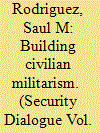

|
|
|
|
|
| Summary/Abstract |
In late 2016, the Colombian government and the Revolutionary Armed Forces of Colombia signed a peace agreement to bring an end to an internal war in Colombia that had lasted more than 50 years. During this process, pro-military attitudes within Colombian society that called for a hardline solution and rejected the peace agreement were highly visible, revealing the extent to which militarism had been embedded in Colombia over the years. This embedding of militarism had been enabled by the country’s many years of chaos and the use of counterinsurgency forms of warfare, which over the years had led civilian elites to adopt a militaristic approach to countering threats. In this article, I will examine key issues related to the central role of militarism and militarization in the scenario of violence and insecurity in Colombia, drawing on mid- and short-term historical perspectives, to highlight what I refer to as the country’s ‘civilian militarism’. First, I discuss how the main conceptual framing regarding militarism, militarization, and security applies to the Colombian case. Second, I describe and analyze the origin of civilian militarism in the context of the struggle between Colombia’s traditional political parties, and the militarization of the police and the intertwining of its role with that of the army as a legacy of that time. Third, I briefly examine how various presidential programs have embedded the concept of security in the 1990s and thereafter, though this is seen as a façade to enable the unfolding of a military approach to countering threats over the years, and how mandatory military service was used until recently as a tool to bolster support for militarism among everyday people.
|
|
|
|
|
|
|
|
|
|
|
|
|
|
|
|
| 3 |
ID:
157921
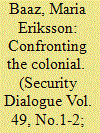

|
|
|
|
|
| Summary/Abstract |
Drawing on postcolonial theory, this article queries into the ways in which the concepts of militarism/militarization and securitization are applied to ‘African’ contexts. We highlight the selective nature of such application and probe into the potential reasons for and effects of this selectiveness, focusing on its signifying work. As we argue, the current selective uses of securitization and militarism/militarization in ‘Africa’ scholarship tend to recreate troublesome distinctions between ‘developed’ versus ‘underdeveloped’ spaces within theory and methodology. In particular, they contribute to the reproduction of familiar colonially scripted imagery of a passive and traditional ‘Africa’, ruled by crude force and somehow devoid of ‘liberal’ ideas and modes of governing. Yet we do not suggest simply discarding ‘selectiveness’ or believe that there are any other easy remedies to the tensions between universalism and particularism in theory application. Recognizing the ambivalent workings of colonial discourse, we rather contend that any attempts to trace the colonial into the present use of the concepts of securitization and militarism/militarization need to acknowledge the problematic nature of both discourses of ‘African’ Otherness and those of universalism and sameness.
|
|
|
|
|
|
|
|
|
|
|
|
|
|
|
|
| 4 |
ID:
157926
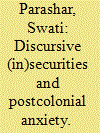

|
|
|
|
|
| Summary/Abstract |
This article queries the intimate relationship between militarism and the state, which is seen as the by-product of ‘postcolonial anxiety’ (Krishna, 1999) related to the survival of the nation-state in the Third World. This anxiety enables militarism at various levels of governance and state interventions in the everyday lives of the citizenry. The article engages with the historical trajectory of the Indian state to argue that its ‘postcolonial anxiety’ engenders militarism not in the immediate aftermath of independence from colonial rule, as in other postcolonial states, but as an anomaly since the end of the Cold War and the advent of globalization. The Indian state rejected militarism immediately after independence, but subsequently used it sporadically to deal with armed insurgencies in the 1970s and 1980s. The popular endorsement of militarism in India coincides with the globalized world order of the 1990s, the move to democratize ‘security’ in discourse and practice, and the adoption of neoliberal developmentalism to ‘catch up’ with the ‘modern’ trajectory of the European nation-states. I argue that this has led to ‘excessive militarism’ that thrives on the shared consensus between the state and citizens that security is a collective enterprise in which the material and affective labour of militarism must be performed by both sides. Citizens embrace military logics and military ethos, both to contest the state’s violence and to confer legitimacy on the state and secure development benefits. The article concludes that militarism opens up new spaces for understanding the complex statebuilding processes of postcolonial societies, the fraught and textured relationship between the state and citizens, and the constant tensions and negotiations between civilian lives and military culture.
|
|
|
|
|
|
|
|
|
|
|
|
|
|
|
|
| 5 |
ID:
157919
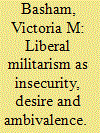

|
|
|
|
|
| Summary/Abstract |
The use and maintenance of military force as a means of achieving security makes the identity and continued existence of states as legitimate protectors of populations intelligible. In liberal democracies, however, where individual freedom is the condition of existence, citizens have to be motivated to cede some of that freedom in exchange for security. Accordingly, liberal militarism becomes possible only when military action and preparedness become meaningful responses to threats posed to the social body, not just the state, meaning that it relies on co-constitutive practices of the geopolitical and the everyday. Through a feminist discursive analysis of British airstrikes in Syria and attendant debates on Syrian refugees, I examine how liberal militarism is animated through these co-constitutive sites, with differential effects. Paying particular attention to gender and race, I argue that militarism is an outcome of social practices characterized as much by everyday desires and ambivalence as by fear and bellicosity. Moreover, I aim to show how the diffuse and often uneven effects produced by liberal militarism actually make many liberal subjects less secure. I suggest therefore that despite the claims of liberal states that military power provides security, for many militarism is insecurity.
|
|
|
|
|
|
|
|
|
|
|
|
|
|
|
|
| 6 |
ID:
157922
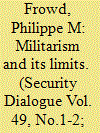

|
|
|
|
|
| Summary/Abstract |
This article assesses the concepts of militarism and militarization in relation to contemporary security interventions in the Sahel, a region increasingly understood through the prisms of violence, cross-border illicit flows, and limited statehood. This region is subject to security interventions that include French military action, EU-funded projects to prevent drug trafficking, and both bilateral and multilateral efforts against irregular migration. To many observers, it is experiencing an ongoing militarization. We argue that while the inextricable concepts of militarism and militarization go some way towards explaining interventions’ occasional use of military violence, they are limited in their grasp of the non-martial and symbolic violence in security practices. We instead propose a focus on assemblages of (in)security to show the heterogeneous mix of global and local actors, and often contradictory rationalities and practices that shape the logics of symbolic and martial violence in the region. Throughout, the article draws on the authors’ fieldwork in Mauritania, Senegal, and Niger, and includes two case studies on efforts against the Sahel’s ‘crime–terror nexus’ and to control irregular migration through the region. The article’s contribution is to better situate debates about militarism and militarization in relation to (in)security and to provide a more granular understanding of the Sahel’s security politics.
|
|
|
|
|
|
|
|
|
|
|
|
|
|
|
|
| 7 |
ID:
157917
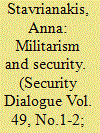

|
|
|
|
|
| Summary/Abstract |
While attention to security has grown exponentially over the last few decades, militarism – the preparation for and normalization and legitimation of war – has not received the widespread and sustained focus it warrants in mainstream or critical circles. Rather than stake a claim for one concept over the other, however, this article – and the special issue to which it serves as an introduction – asks how we are to understand the relationship between security and militarism, both as analytical tools and as objects of analysis. We examine, first, what analytical and political work militarism and security do as concepts, and how they can be mobilized methodologically; second, what the possibilities are of fruitful exchange between knowledges produced about these concepts or practices; and, third, what the limits are of militarism and security. In the process, we address the shifts in the world that international relations and its related subfields study; shifts in the institutional framing and materiality of fields and subfields of research; and shifts in how international relations studies the world. Read together, the contributions to the special issue make the case for a reinvigorated focus on the mutual co-constitution of militarism and security.
|
|
|
|
|
|
|
|
|
|
|
|
|
|
|
|
| 8 |
ID:
157920


|
|
|
|
|
| Summary/Abstract |
This article argues for a reformulation of the concept of ‘militarism’ as ideology. Although existing sociological approaches have been suspicious of an understanding of militarism as ideology, these criticisms have misrepresented the implications of adopting such a concept. By returning to Althusser’s classic study of ideology, and complementing it with more recent psychoanalytic approaches that emphasize the centrality of desire, the article shows that thinking of militarism as ideology can be complementary to existing sociological studies. Moreover, though, it argues that such a reformulation brings with it key advantages. This is because it foregrounds the task of anti-militarist critique in a way that has hitherto been lacking. To demonstrate this point, the article considers the contribution that a concept of militarism as ideology could make to existing debates in critical security studies. Recent debates in this subfield have examined the ethical ramifications of various understandings of security for the pursuit of violence. However, these arguments have frequently reached a deadlock because of an inadequate understanding of the nature of militarism, one that borrows implicitly from prevalent sociological definitions of the concept. Instead, the article presents an understanding of militarism as ideology as a way out of these difficulties, showing how a critique of violence based on this concept of militarism rather than security can be more effective.
|
|
|
|
|
|
|
|
|
|
|
|
|
|
|
|
| 9 |
ID:
157918
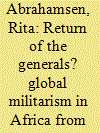

|
|
|
|
|
| Summary/Abstract |
Militarism is always historically constructed and context specific and must therefore be studied at the intersection of the global and the local. This article does so by tracing the continuities and changes of global militarism in Africa from the Cold War to the present. It argues that contemporary global militarism on the continent differs from its predecessor in two crucial aspects. First, it is promoted by development actors as much as by military establishments and is more firmly embedded within discourses of development and humanitarianism. Second, contemporary militarism remains focused on political order and stability but it is more concerned with war and direct combat. The article probes this paradox through an engagement with the concepts of security and securitization. It argues that today’s militarism is suffused with the values of security and that it is precisely the logic of security and securitization that gives it its contemporary political force.
|
|
|
|
|
|
|
|
|
|
|
|
|
|
|
|
| 10 |
ID:
157924


|
|
|
|
|
| Summary/Abstract |
Militarism – a mercurial, endlessly contested concept – is experiencing a renaissance of sorts in many corners of the social science community. In critical security studies, the concept’s purview has become increasingly limited by an abiding theoretical and analytical focus on various practices of securitization. We argue that there is a need to clarify the logic and stakes of different forms of militarism. Critical security scholars have provided valuable insights into the conditions of ‘exceptionalist militarism’. However, if we accept that militarism and the production of security are co-constitutive, then there is every reason to consider different manifestations of militarism, their historical trajectories and their interrelationships. To that end, we draw on the work of historical sociologists and articulate three more ideal types of militarism: nation-state militarism, civil society militarism and neoliberal militarism. We suggest this typology can more adequately capture key transformations of militarism in the modern period as well as inform further research on the militarism–security nexus.
|
|
|
|
|
|
|
|
|
|
|
|
|
|
|
|
| 11 |
ID:
157927
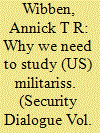

|
|
|
|
|
| Summary/Abstract |
Responding to the special issue call to examine security and militarism alongside one another, this article adopts a critical feminist lens to explore what is at stake when critical scholars study security rather than militarism – and why, for critical feminists in particular, studying one without attention to the other is not helpful. Anchoring the discussion of (US) militarism in ongoing debates about women in combat, the article proposes that studying security without attention to militarism leads scholars to miss the deeply militarist orientation of security studies. It further suggests that feminist scholarship, because it treats militarism and militarization as an integral part of feminist security studies and considers the everyday a crucial site for inquiry, is well suited to studying militarism and security alongside one another. The article then lays out what a critical feminist approach to studying militarism entails and presents some feminist insights on militarization, focusing in particular on what attention to gender can reveal about shared norms of manliness and war. Overall, the article shows why feminist perspectives offer such strikingly different insights into the relationship between militarism and security and what we miss when feminist scholarship is ignored or marginalized in scholarship on these issues.
|
|
|
|
|
|
|
|
|
|
|
|
|
|
|
|
|
|
|
|
|